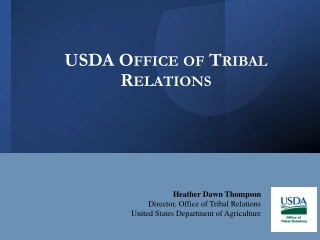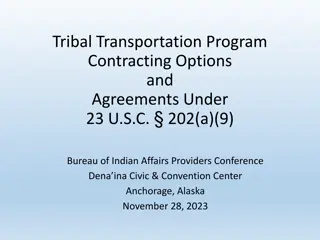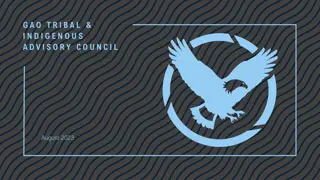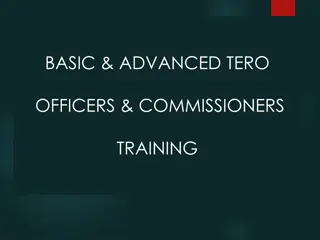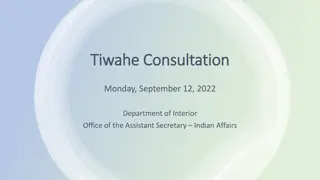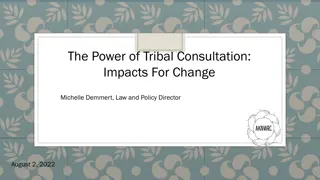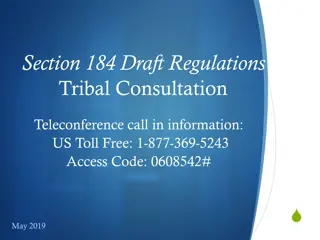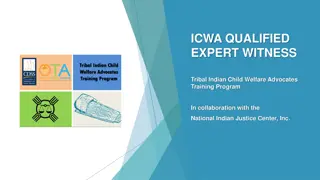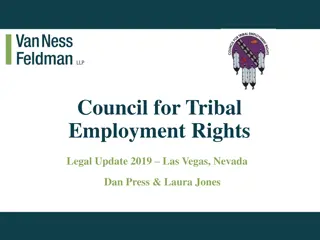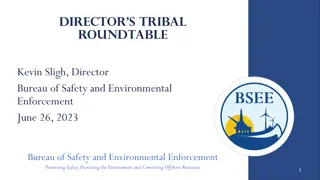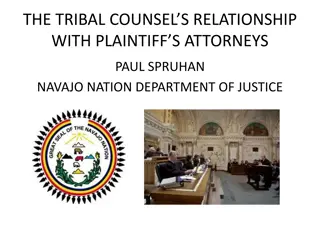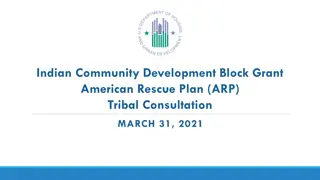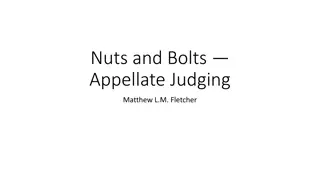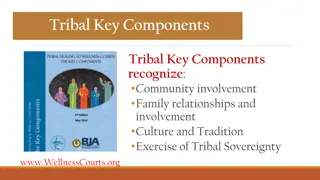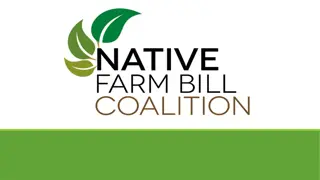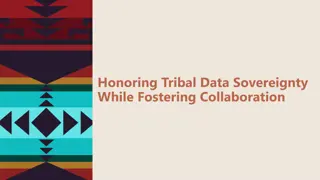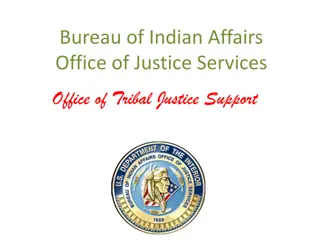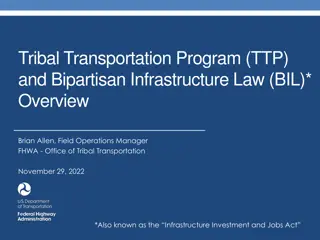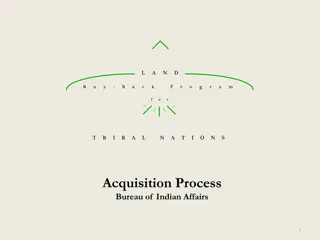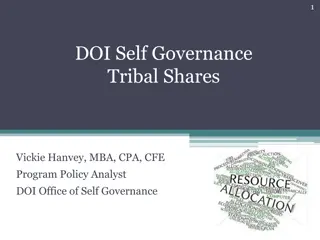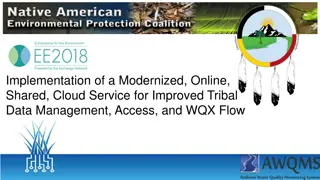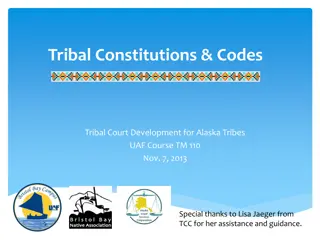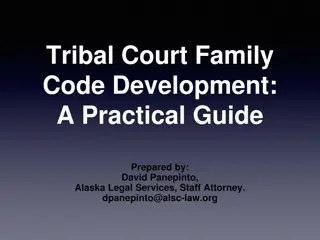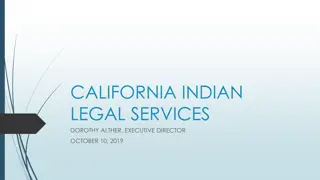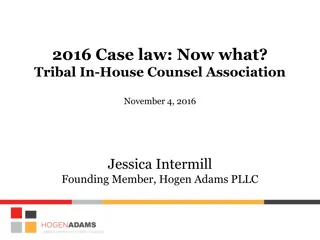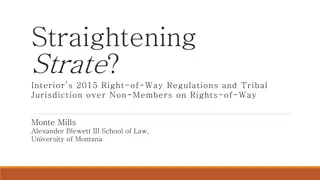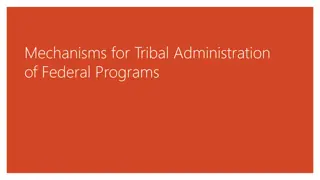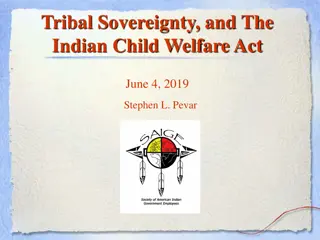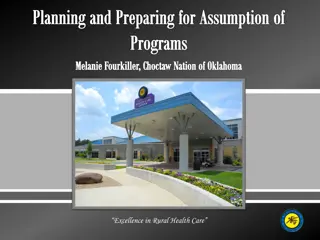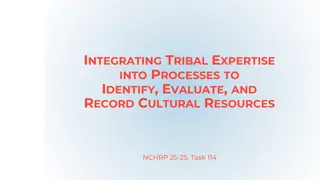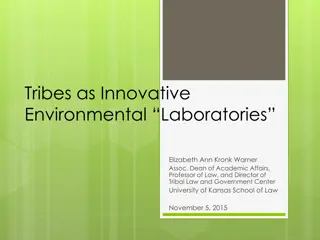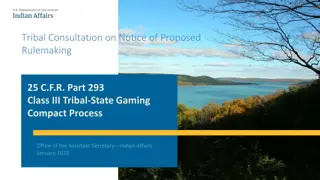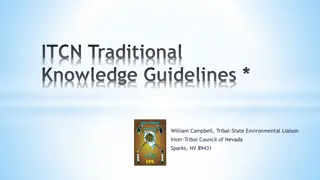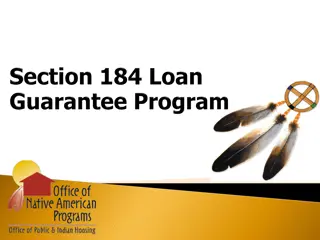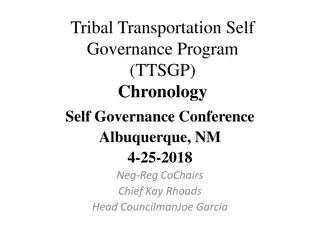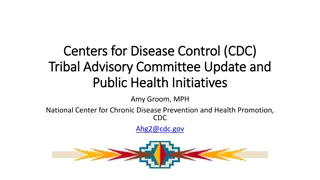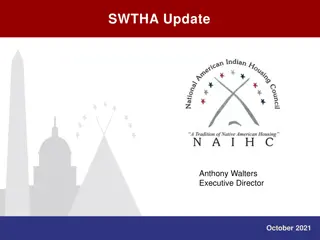Enhancing Health Coverage in Tribal Communities: Best Practices and Lessons Learned
Explore best practices and lessons learned in improving health coverage for Tribal communities, as advocated by the National Indian Health Board (NIHB). Discover the challenges faced and overcome by Tribal enrollment assisters, along with valuable outreach and education efforts to empower individual
2 views • 16 slides
USDA Tribal Relations and Federal Policy in Native Agriculture
Explore the role of the USDA Office of Tribal Relations and the USDA Tribal Advisory Committee in addressing barriers and federal policies impacting tribal agriculture. Learn about tribal eligibility, statutory requirements, and the historical eras of federal Indian policy affecting Native American
0 views • 36 slides
History of Tribal Transportation Program Evolution
The evolution of the Tribal Transportation Program, from its origins under the Department of the Interior to the establishment of the Federal Lands Highway Program and its subsequent amendments and expansions through key legislative acts, has shaped the program into what it is today. The shift towar
1 views • 24 slides
GAO Tribal & Indigenous Advisory Council - August 2023
GAO initiated the first-ever Tribal and Indigenous Advisory Council in 2022 to address issues concerning Tribal Nations and their citizens. This council, consisting of 16 members, aims to provide insights and recommendations on emerging topics, diverse perspectives, and working processes. The focus
0 views • 7 slides
Tribal Workforce Protection and Sovereignty-based Legislation
Tribal workforce protection and sovereignty-based legislation play a crucial role in safeguarding diverse workforces from discrimination, harassment, and disparate treatment. This legislation, enacted by Tribal Governments, aims to ensure equal rights and opportunities for individuals regardless of
1 views • 22 slides
Tiwahe Consultation: Empowering Tribes for Community Development
Tiwahe, meaning "Family" in Lakota, focuses on empowering Tribes to design programs integrating services with Tribal culture for community benefit. Components include Job Placement, Social Services, Housing, and more. Funding from 2015-2020 supported various initiatives. The Tiwahe Initiative center
0 views • 9 slides
The Power of Tribal Consultation: Enhancing Government-to-Government Dialogue
This compilation highlights the significance of tribal consultation in strengthening relationships between the federal government and Tribal Nations, emphasizing the need for inclusive policy deliberation. It underscores the critical role of feedback opportunities, joint coordination, and communicat
0 views • 8 slides
Comprehensive Overview of Section 184 Draft Regulations for Tribal Consultation
This detailed document provides essential information on the Section 184 Draft Regulations for Tribal Consultation, including call-in details, program requirements, lender eligibility, tribal participation, servicing, claims, and more. It covers definitions, lender application processes, tribal elig
6 views • 20 slides
Tribal Indian Child Welfare Advocates Training Program
This training program focuses on qualifying expert witnesses in Indian Child Welfare Act (ICWA) cases, covering topics such as the role of expert witnesses, tribal sovereignty, and ethical responsibilities. It aims to enhance the understanding and application of ICWA provisions for tribal social wor
1 views • 63 slides
Tribal Employment Rights and Jurisdiction: Legal Update 2019
The legal update discusses the basis for tribal employment authority, Indian preference in hiring, tribal jurisdiction over non-Indians, exceptions under the Montana Test, and tribal jurisdiction over rights-of-way. It highlights the sovereign authority of American Indian tribes, statutory recogniti
5 views • 8 slides
Measures of Protection for Tribal Development in India
The post-independence era in India saw significant efforts towards tribal development, emphasizing principles like respecting tribal rights, preserving culture, and avoiding imposition. Various viewpoints were presented, including policies of isolation, assimilation, and integration. These approache
1 views • 14 slides
Bureau of Safety and Environmental Enforcement Tribal Roundtable
The Bureau of Safety and Environmental Enforcement's Tribal Roundtable, led by Director Kevin Sligh, focuses on promoting safety, protecting the environment, and conserving offshore resources. The agenda includes discussions on carbon sequestration, oil spill response preparedness, renewable energy,
2 views • 30 slides
Tribal Court Dynamics: Relationship, Reasons, and Examples
Explore the dynamics of tribal court systems, including the relationship between tribal counsel and plaintiff attorneys, potential reasons for using tribal tort law in court, jurisdictional challenges faced, and examples from Navajo and Non-Navajo cases.
1 views • 9 slides
Mahasweta Devi: Championing Tribal Rights Through Literature
Mahasweta Devi, an Indian writer and tribal activist, uses her powerful writings to shed light on the plight of tribal communities in India. Through her works like "The Hunt" and "Draupadi", Devi addresses issues of exploitation, deforestation, and gender identity, highlighting the strength and stru
3 views • 15 slides
Tribal Consultation for Indian Community Development Block Grant American Rescue Plan
President Biden signed the American Rescue Plan Act of 2021, providing $280 million for the Indian Community Development Block Grant program to address COVID-19-related challenges. The Department of Housing and Urban Development is conducting Tribal consultation to determine the administration of th
2 views • 8 slides
Understanding Appellate Judging and Tribal Customary Law
Dive into the intricate world of appellate judging with Matthew L.M. Fletcher's "Nuts and Bolts: Appellate Judging." Explore the essential components of legal opinions, procedural histories, facts, and legal analysis. Delve into the introduction of tribal customary law and gain insights from tribal
0 views • 19 slides
Tribal Wellness Court Key Components and Tips
The Tribal Wellness Court emphasizes Community Involvement, Family Relationships, Culture, and Exercise of Tribal Sovereignty. Key components include Individual and Healing Focus, Screening and Eligibility, and Referral Points. Tips focus on Advisory Board involvement, Legal and Clinical Eligibility
0 views • 25 slides
Native Farm Bill Coalition: Supporting Tribal Provisions and Consultation
Over 170 tribes and 77 Native Nations are represented in the Native Farm Bill Coalition, advocating for 63 tribal-specific provisions in the Farm Bill. The coalition welcomes more tribal leadership and organizations to join, offering tailored support, updates, and resources. Additionally, an upcomin
0 views • 9 slides
Fostering Tribal Data Sovereignty in Collaborative Partnerships
Explore the significance of data sovereignty within Tribal Advisory Committees (TACs) and the Government Accountability Office (GAO), considering how tribal data sharing can be respectful of sovereignty. Delve into the impact of data on tribal communities, the unique role of the GAO, and discuss str
0 views • 11 slides
Bureau of Indian Affairs Office of Justice Services
The Bureau of Indian Affairs Office of Justice Services, along with the Office of Tribal Justice Support, plays a crucial role in supporting Tribal Justice systems across various Native American tribes in the United States. They provide assistance in areas such as criminal law, diversion and re-entr
0 views • 13 slides
Tribal Transportation Program & Bipartisan Infrastructure Law Overview
The Tribal Transportation Program (TTP) and Bipartisan Infrastructure Law (BIL) provide funding for essential transportation projects in Tribal communities. The TTP Bridge Fund, Safety Fund, and High Priority Projects aim to improve infrastructure and safety. The BIL funding for FY22-FY26 totals $3.
1 views • 13 slides
Buy-Back Program for Tribal Nations Acquisition Process
The Buy-Back Program by the Bureau of Indian Affairs focuses on implementing valuation, acquisition, and tribal collaboration for land tracts. It outlines eligibility criteria for tracts and interests, including ownership status and tribal jurisdiction. The program also highlights ineligibility fact
0 views • 15 slides
Overview of Tribal Self-Governance Program and PROGRESS Act
The Tribal Self-Governance Program, under the Indian Self-Determination and Education Assistance Act, allows tribes to operate services efficiently. The PROGRESS Act, signed into law in 2020, enhances self-governance and self-determination for Indian tribes by creating administrative efficiencies. I
0 views • 14 slides
Modernized Tribal Data Management Cloud Service
Implementation of a modernized, online, shared cloud service for improved tribal data management, access, and WQX flow. NAEPC provides technical assistance, environmental education, and professional training, focusing on intertribal coordination. The project involves 9 tribal partners and aims to en
0 views • 35 slides
Understanding Tribal Constitutions and Court Development for Alaska Tribes
Explore the significance of tribal constitutions, court codes, and the development of tribal courts for Alaska tribes. Learn about the functions, importance, and provisions of tribal constitutions and codes, as well as their role in governing tribal activities and promoting cultural traditions. Disc
1 views • 18 slides
Tribal Court Family Code Development: A Practical Guide
Practical guide prepared by David Panepinto from Alaska Legal Services focusing on the development of family codes within tribal courts. The guide covers steps such as understanding judicial codes, involving tribal councils, types of laws, and jurisdictional considerations.
0 views • 31 slides
California Indian Legal Services Overview
California Indian Legal Services, established in 1967, provides legal assistance to low-income Native Americans, tribes, and tribal organizations in California. With four offices located strategically across the state, they offer a range of services including tribal representation, tribal government
0 views • 7 slides
Tribal In-House Counsel Association 2016 Case Law Update
Explore key cases and developments in tribal law from 2016, including Supreme Court decisions impacting tribal sovereignty and immunity. Gain insights on ongoing cases, such as Lewis v. Clarke, and considerations for tribal jurisdiction. Stay informed on the latest legal issues affecting Indian trib
0 views • 11 slides
New Right-of-Way Regulations and Tribal Jurisdiction Overview
The article discusses new right-of-way regulations proposed in 2014 and finalized in 2015, focusing on tribal jurisdiction over non-members on rights-of-way. It explores the impact on tribal lands and civil jurisdiction, detailing the Secretary's grant of rights-of-way and the implications on Indian
0 views • 17 slides
Empowering Tribal Sovereignty through Self-Governance of Federal Programs
Exploring mechanisms for tribal administration of federal programs, focusing on the Indian Self-Determination and Education Assistance Act. It highlights self-governing initiatives in areas like transportation and employment training, emphasizing tribal control and decision-making authority over res
0 views • 8 slides
Understanding Tribal Sovereignty and the Indian Child Welfare Act
Tribal sovereignty is a fundamental right for Indian tribes, allowing them to be self-governing. The concept of sovereignty entails independent and supreme authority to make and enforce laws. This article explores whether tribal governments are sovereign entities, presenting different viewpoints and
0 views • 32 slides
Planning and Preparing for Assumption of Programs in Rural Health Care
Detailed information is needed on all PSFAs considered for assumption by the Tribe. Researching PSFAs involves obtaining information from various sources, reviewing financial data, and engaging with SG Tribal networks. Analysis and decision-making must involve community and tribal leader direction t
0 views • 19 slides
Integrating Tribal Expertise into Cultural Resource Processes
This project, NCHRP 25-25 Task 114, focuses on incorporating tribal perspectives and expertise into the Section 106 process of the National Historic Preservation Act for surface transportation projects. The research objective is to understand how tribal knowledge informs the identification, evaluati
0 views • 19 slides
Tribal Environmental Laws: Promoting Sovereignty and Protection
Explore the significance of tribal environmental laws in promoting sovereignty and addressing emerging environmental challenges. Delve into the applicability of federal laws in Indian Country, the reasons for enacting tribal environmental laws, and the innovative approaches tribes are taking in envi
0 views • 14 slides
Tribal Consultation on Notice of Proposed Rulemaking for Class III Tribal-State Gaming Compact Process
Consultation details for the proposed rulemaking process regarding Class III Tribal-State Gaming Compacts, including schedule, submission deadlines, and key changes outlined in the Notice of Proposed Rulemaking.
0 views • 5 slides
Understanding Traditional Knowledge Guidelines and Principles
Traditional Knowledge (TK) Guidelines and Principles cover important aspects like Free, Prior, and Informed Consent (FPIC), the impact of climate change on Tribal Communities, and the fundamental principles of Tribal Sovereignty over TK. These guidelines emphasize the importance of consent, tribal s
0 views • 17 slides
Housing Opportunities for Tribal Communities
Bay Bank, owned by the Oneida Nation, is a prominent HUD 184 lender in the Great Lakes area, offering financial support to underserved tribal communities. The government-to-government relationships, unique land status, and limited housing supply pose challenges for accessing financing. However, oppo
0 views • 16 slides
Tribal Transportation Self Governance Program (TTSGP) Chronology and FAST ACT Updates
This content covers the tribal transportation self-governance program (TTSGP) and the Fast Act regulations development process, including negotiated rulemaking and committee protocols. It outlines the timeline of meetings and activities related to the negotiation and implementation of regulations fo
0 views • 8 slides
CDC Tribal Advisory Committee Update and Public Health Initiatives
Centers for Disease Control (CDC) works with tribal governments, focusing on public health initiatives to support tribal sovereignty and self-determination. The CDC/ATSDR Tribal Advisory Committee (TAC) provides input and guidance on health issues in AI/AN nations, emphasizing government-to-governme
0 views • 12 slides
Updates and Reauthorizations in Tribal Housing Programs
Anthony Walters appointed as Executive Director for SWTHA in October 2021. NAHASDA commemorates its 25th Anniversary with special events. Reauthorization efforts for NAHASDA through bills like S.2264 and H.R. 5195 are underway. Congressional members are working on NAHASDA reauthorizations to be incl
0 views • 15 slides

